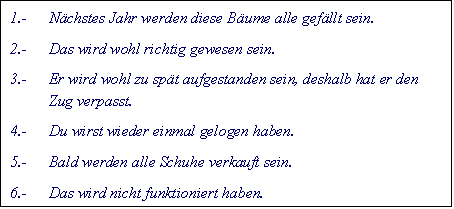The Future Perfect (Futur II)
We use the Futur II to describe events that have probably happened in the past, and with events that will happen in the future. Therefore, it can equally have a past or future value.
a) Probable past
When you suppose that an action has probably happened in the past but you aren't totally sure, you use the Futur II.
| Er wird schon nach Hause gegangen sein. |
| He will already have gone home. |
| - |
| Du wirst wieder einmal vergessen haben, deinen Wecker zu stellen. |
| You will have forgotten again to put your alarm clock on. |
To express a supposition you can also use the perfect + wohl.
| Du hast wohl vergessen, deinen Wecker zu stellen. |
| You will have forgotten again to put your alarm clock on. |
It can be used to describe an event that you hope will terminate in the future. It has a similar use as the perfect tense when it is used with future value.
The Futur II, the same as the perfect in this case, has to be accompanied by a time expression.
| Wir werden bald gewonnen haben. |
| We will have won soon. |
You can also say the same thing using the perfect:
Another example:
| In drei Tagen wirst du es geschafft haben. |
| Within three days, you will have managed it. |
c) To express something that happens before a future action.
| Nächsten Dienstag wird die Entscheidung schon gefallen sein. Dann werden wir weiter sehen. |
| Next Tuesday the decision will be made. Then we will see. |
---------------- oooo O oooo ----------------
Exercises
Translate the following sentences and indicate when the Futur II is meant as a supposition with a past or future value.
(Click on the box to see the answers; double click to return to the original position)


